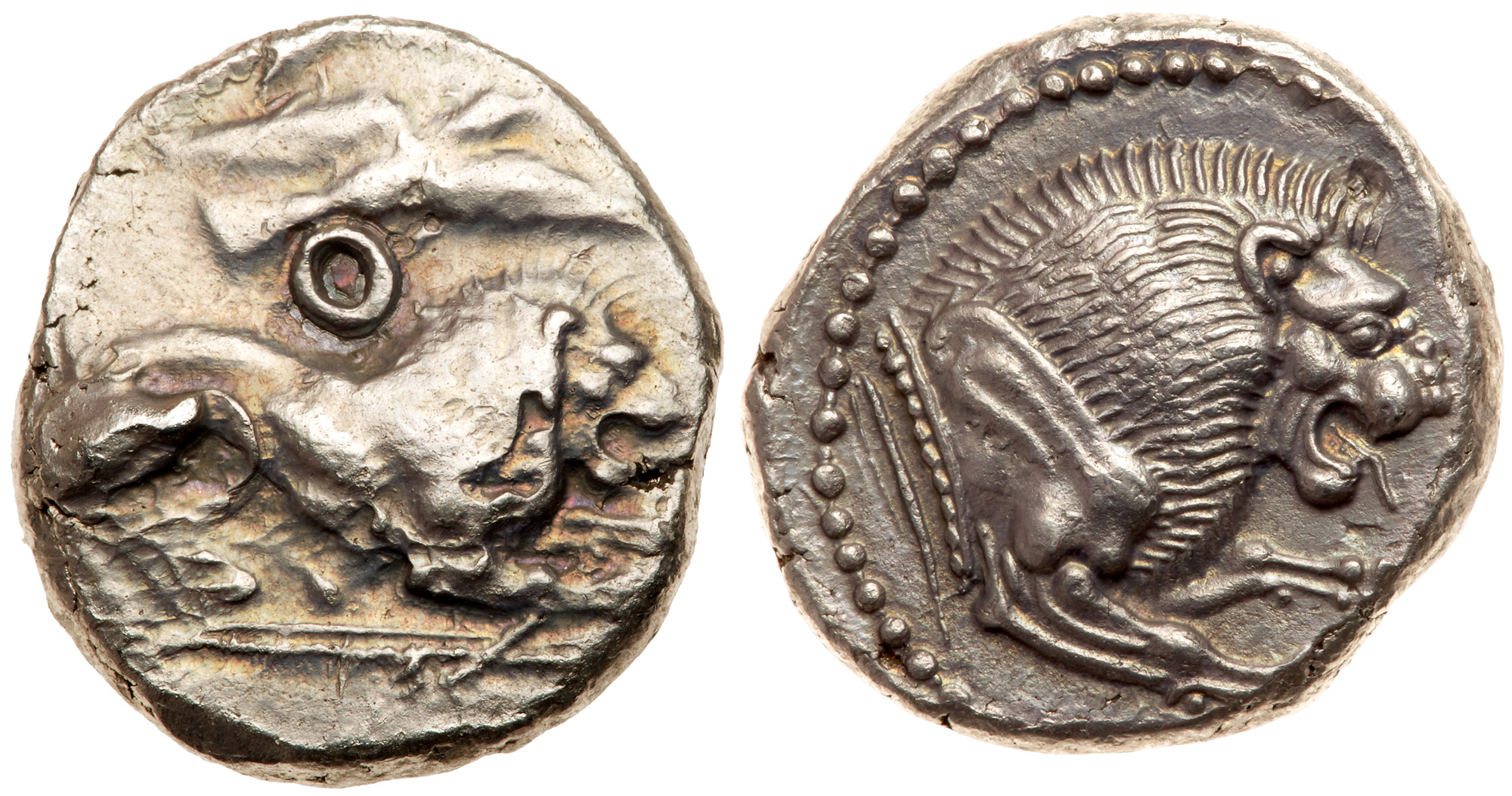449 BCE - 425 BCE | L'Z'B'L (in Phenician)
Overstriking coin
Citium_over_Amathus_Classical_Numismatic_Group, _EA_446, _19_June_2019, _131.jpg
[1]
Overstruck variety
Amathus under Citium.jpg
[2]
|
|
Sale(s)Sale(s) ᵖ:
|
Classical Numismatic Group, EA 446, 19 June 2019, 131
|
|
|
|
Description
| ObverseInscription or printing placed on the obverse.:
|
Herakles in fighting stance to right, wearing lion skin upon his back and tied around neck, holding club overhead in right hand and bow extended before him in left hand. Dotted border.
|
ReverseInscription or printing placed on the reverse.:
|
L'Z'B'L (in Phenician) (Aramaic) Lion attacking stag crouching right inside dotted border within incuse square.
|
Mint and issuing power
Chronology
| FromIdentifies the initial date in a range assigned in a numismatic context. 449 BCE toIdentifies the final date in a range assigned in a numismatic context.. 425 BCE
|
Classical 480-323 BC  periodTime period of the numismatic object. periodTime period of the numismatic object.
|
Physical description
MetalThe physical material (usually metal) from which an object is made.: Silver 
|
WeightWeight of the numismatic object (in grams). in grams: 10.9610.96 g <br />10,960 mg <br />
|
DenominationTerm indicating the value of a numismatic object. Examples: tetradrachm, chalkous, denarius.: double siglos 
|
AxisDescribes the directional relationship between the obverse and reverse of a numismatic object.: 1212 mm <br />1.2 cm <br />
|
| DiameterDescribes diameter of an object (in mm).: 2323 mm <br />2.3 cm <br />
|
StandardStandard.: Persian
|
References
Description
| ObverseInscription or printing placed on the obverse.:
|
Lion crouching right, above, eagle flying right, between lion and eagle
|
ReverseInscription or printing placed on the reverse.:
|
Lion forepart right. Border of dots.
|
Mint and issuing power
| MintIdentifies the place of manufacture or issue of a numismatic object. ᵖ:
|
Amathus
|
Ancient regionAncient region. ᵖ
|
Cyprus
|
Modern countryModern country: Greece
|
AuthorityIdentifies the authority in whose name (explicitly or implicitly) a numismatic object was issued. ᵖ:
|
|
Chronology
| FromIdentifies the initial date in a range assigned in a numismatic context. 450 BCE toIdentifies the final date in a range assigned in a numismatic context.. 435 BCE
|
Classical 480-323 BC  periodTime period of the numismatic object. periodTime period of the numismatic object.
|
Physical description
| DenominationTerm indicating the value of a numismatic object. Examples: tetradrachm, chalkous, denarius. ᵖ:
|
double siglos 
|
StandardStandard. ᵖ:
|
Persian
|
References
| Frequency of overstrikesFrequency of overstrikes:
|
frequent
|
Level of confidenceLevel of confidence of the identification:
|
sure
|
| RemarksRemarks:
|
"overstruck on an Amathos stater of type Amandry, Monnayage 126A. Undertype on both sides is clearly visible"
|
References
- ^ Wroth, Warwick William (1886), A Catalogue of the Greek coins in the British Museum. vol. X : Crete and the Aegean Islands, London, The Trustees, p. 152, pl. XXIX
- a b Tziambazis, Elias (2002), A catalogue of the coins of Cyprus: from 560 B.C. to 1571 A.D., Larnaca, 89 p.
- ^ Zapiti, Eleni - Michaelidou, Lefki (2008), Coins of Cyprus : from the collection of the Bank of Cyprus Cultural Foundation, Nicosia, Bank of Cyprus Cultural Foundation, 329 p.
- ^ Amandry, Paris (1984), "Le monnayage d'Amathonte", in Pierre Aupert and Marie-Christine Hellmann (eds.), Amathonte I. Testimonia. 1. Auteurs anciens - Monnayage - Voyageurs Fouilles - Origines - Géographie, Etudes chypriotes 4, Paris, p. 57-76, pl. 11-20.

